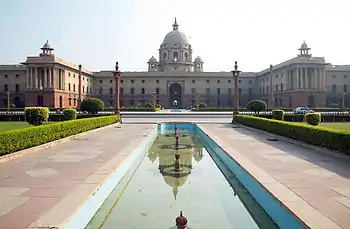Ministry of External Affairs (India)
The Ministry of External Affairs (abbreviated as MEA; IAST: Vidésha Mantrālaya) of India, also known as the Foreign Ministry, is the government agency responsible for the conduct of foreign relations of India. The Ministry comes under the Government of India and is responsible for India's representation in the United Nations. It also advises other Ministries and State Governments when the latter have dealings with foreign governments or institutions.
 | |
 South Block | |
| Ministry overview | |
|---|---|
| Formed | 2 September 1946 |
| Jurisdiction | Republic of India |
| Headquarters | South Block Raisina Hill, New Delhi |
| Employees | 11,403[1] (2018 est.) |
| Annual budget | ₹18,000 crore (US$2.5 billion) (2021-2022 est.)[2] |
| Minister responsible | |
| Deputy Minister responsible |
|
| Ministry executives |
|
| Website | www |
Brief history
The Ministry was initially the Ministry of External Affairs and Commonwealth Relations, a holdover from the British Raj. It was renamed the Ministry of External Affairs in 1948.[5] Prime Minister Jawaharlal Nehru held the portfolio as an additional charge till his death in 1964 and it was only then that a separate Minister with Cabinet rank was appointed. The ministry is responsible for the administration of Naga Hills, Tuensang Area, Indian Emigration Act of 1923, the Reciprocity Act of 1943, the Port Haj Committee Act of 1932, the Indian Merchant Shipping Act in so far as it relates to pilgrim ships, the Indian Pilgrim Shipping Rules of 1933, the Protection of Pilgrims Act of 1887 (Bombay) and the Protection of the Mohammedan Pilgrims Act of 1896 (Bengal) are also the special responsibility of the Ministry of External Affairs.
The Ministry is the cadre controlling authority of the Indian Foreign Service, the service is wholly under the administration and supervision of the External Affairs Ministry.
Bureaucratic structure
1948–1964
The Secretary General was the senior most official in the ministry till the post was abolished in 1964.[6] The delineation of responsibilities up to that time was as follows:
- The Secretary General was the principal official adviser to the Prime Minister on matters relating to foreign policy and was responsible for overall supervision of the Ministry.
- The Foreign Secretary dealt with the American, Western and Eastern Divisions and the West Asian and North African countries of the Southern Division. In addition, she/he was in charge of the Divisions dealing with Protocol, External Publicity, and the Historical Records. His/Her main task was to coordinate among the various Divisions in the Ministry.
- The Commonwealth Secretary dealt with all the Commonwealth countries with the not exception of Canada which was the responsibility of the Americas Division. She/he was also in charge of the South Asian countries of the Southern Division, and the African Division.
- The Special Secretary was in charge of administration of the Ministry, and posts and missions abroad.[7]
Current structure
The Foreign Secretary is the most senior civil servant who is the head of the Department of Foreign Affairs,[8] and is supported by other secretary level officers.
- Foreign Secretary — Harsh Vardhan Shringla[9]
- Secretary (West) — Vikas Swarup[9]
- Secretary (East) — Riva Ganguly Das[9]
- Secretary (Economic Relations) — Rahul Chhabra[9]
- Secretary (Consul, Passport, Visa and Overseas Indian Affairs) — Sanjay Bhattacharyya[9]
- Joint Secretary (External Publicity) and Official Spokesperson — Anurag Srivastava[9][10]
Development Partnership Administration
Development Partnership Administration (DPA) is an agency under the Ministry of External Affairs formed in 2013 to increased its strategic footprint and for the effective execution of projects with professionals from diverse backgrounds. India has an elaborate project portfolio in its neighbourhood, including Bhutan, Nepal, Afghanistan, Maldives, Sri Lanka, and Bangladesh, as well as Africa and Latin America.
It is headed by Sujata Mehta, one of India’s foremost diplomats and former Indian representative to UN Conference on Disarmament, Geneva. Mehta is Special Secretary in the MEA.[11][12]
India Perspectives
India Perspectives[13] is the flagship publication of the Ministry of External Affairs. A bi-monthly magazine, it is digitally published in English and Hindi, and 14 other international languages, with a readership spanning 170 countries. It is crafted to support the Ministry’s diplomatic initiatives and highlight India’s bilateral ties with the rest of the world.
The magazine provides an insight into India’s culture and tradition along with elements of contemporary India. With intelligent, analytical and verified editorial content, the publication is one of the most authentic sources of information regarding India’s ‘soft diplomacy’ initiatives as well as its rich cultural, scientific and political heritage. By showcasing the country’s various facets through original stories on travel, art, music, cinema and more, the magazine takes India to the world.
MEA diplomat-authors
Diplomats from other countries such as Gabriela Mistral, Octavio Paz, Pablo Neruda, St John Perse, Ivo Andric, George Seferis have won distinctions such as the Nobel Prize in Literature. Prominent diplomats-turned-authors who started their careers with the Indian Foreign Service and Ministry of External Affairs include Vikas Swarup, Navtej Sarna and Abhay K.
Location
The office of the Ministry is located in the South Block building which also contains the Prime Minister's office and Ministry of Defence. Other offices are located in Jawaharlal Nehru Bhawan, Shastri Bhawan, Patiala House, and ISIL Building.[14]
See also
References
- Thakur, Pradeep (2 March 2017). "Central govt to hire 2.8 lakh more staff, police, I-T & customs to get lion's share". The Times of India. New Delhi. Retrieved 14 January 2018.
- "Union budget allocates over Rs 18,000 cr for external affairs ministry, Rs 7,149 cr for foreign aid". ANI News. Retrieved 2 February 2021.
- "Harsh Vardhan Shringla takes over as foreign secretary: The Economic Times". The Economic Times. 29 January 2020.
- https://www.mea.gov.in/ser.htm. Missing or empty
|title=(help) - "REPORT OF THE Ministry of External Affairs 1949-50" (PDF). Government of India. Retrieved 10 October 2012.
- "REPORT OF THE Ministry of External Affairs 1964-65" (PDF). Government of India. Retrieved 10 October 2012.
- "REPORT OF THE Ministry of External Affairs 1956-57" (PDF). Government of India. Retrieved 10 October 2012.
- "Who is Who: Organisation Structure and officers of the Ministry of External Affairs of Republic of India" (PDF). Ministry of External Affairs. Archived from the original (PDF) on 14 February 2012. Retrieved 15 February 2012.
- "Secretaries, Ministry of External Affairs". Retrieved 31 July 2020.
- "Spokesperson's Office". Ministry of External Affairs, Government of India. 11 October 2017. Retrieved 18 January 2018.
- "Devyani likely to head MEA's overseas projects department". The Indian Express. 20 January 2014.
- "Organogram of Ministry of External Affairs" (PDF). Government of India. Retrieved 19 January 2014.
- India Perspectives homepage
- About MEA : South Block. MEA (2014-03-19). Retrieved on 2014-05-21.